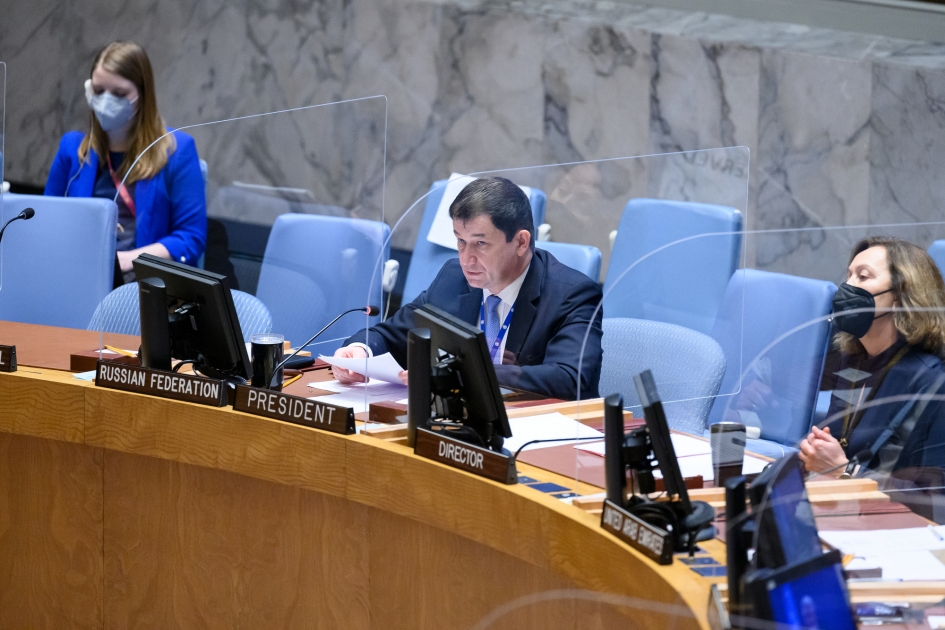Statement by First Deputy Permanent Representative Dmitry Polyanskiy at UNSC briefing on the situation in the Middle East including the Palestinian question
We thank Tor Wennesland for his substantive review of the situation in the Middle East in the context of Middle Eastern settlement.
As we take it from the briefing of Special Coordinator, the stagnation and de facto stalemate of Palestinian-Israeli settlement provoke an outbreak of violence in the West Bank and Eastern Jerusalem. Against this backdrop, construction and expansion of settlements continues, as well as confiscation of lands, eviction of Palestinians, demolition of houses, arbitrary arrests and detentions, and attempts to change the historical status quo of the complex of Al-Aqsa mosque.
Our growing concern is caused by attacks of the settlers that are reportedly getting more frequent, as well as disproportionate use of force by Israeli military against Palestinians, which causes numerous deaths and injuries among civilians. This is best illustrated by a high-profile eviction and demolition of a house of a Palestinian family that happened in January this year in Sheikh Jarrah neighborhood of Eastern Jerusalem. This incident gave a start to a tide of protests regarding the Palestinian issue. Besides, we are concerned over Tel Aviv’s announced plans for expanding settlement activity in the occupied Golan Heights, which directly contradicts the provisions of the 1949 Geneva Convention. We stress Russia’s unchanging position, according to which we do not recognize Israeli sovereignty over the Golan Heights that are an inalienable part of Syria.
In this context, the number one task is as follows: ensure lasting stabilization, reject provocations and unilateral steps that create irreversible facts on the ground, recover political prospects for revitalizing the peace process on the universally recognized international legal basis for the Middle Eastern settlement. We are convinced that settlement can only be effected through launching direct negotiations of the sides.
Another key prerequisite for breaking this deadlock is overcoming the inter-Palestinian division. We welcome efforts of the Arab states, in particular Egypt and Algeria aimed at establishing dialogue between Palestine’s main political forces. Our proposal to convene another inter-Palestinian meeting in Moscow as soon as the participants are able to endorse shared approaches and put them down in a document remains on the table.
Besides, we continue interacting with Palestinians and Israelis, as well as international and regional stakeholders, i.a. in the framework of the Middle East Quartet of intermediaries – today’s only internationally recognized format for fostering Middle Eastern settlement that has been approved by UNSC resolutions. We will keep working actively with our partners in the Quartet to enhance effectiveness of this mediator mechanism by defining collective steps that should help implement the UN-endorsed two-state solution. We reiterate the importance of holding a ministerial meeting of the Quartet and making this mechanism work closely with Palestinians, Isarelis, and key regional stakeholders. In this regard, we would like to flag an important aspect. Conditions for resolving a conflict and starting collective efforts can never be perfect. If they could, there would be no conflicts at all. However if one chooses to stay idle saying that the environment is not favorable yet, there will be no progress. So we call upon all interested sides to respond to our initiatives.
We highlight the importance of providing comprehensive humanitarian assistance to those in need who are located on the occupied Palestinian territories and in Gaza, as well as Palestinian refugees in neighboring Arab states. On our part, we support efforts of specialized international organizations, among which we specifically point out UNRWA. In this connection, we draw attention to UNRWA’s appeals to the global community and calls to accumulate the much-needed funds so that the Agency could keep rendering humanitarian assistance to Palestinian refugees in the Middle East. Russia will set forth its financial support for UNRWA by making annual voluntary contributions to its budget.
Thank you.
